The original article was published by SoftFormance https://www.softformance.com/blog/why-django-framework/
I am a former developer with more than a decade of experience in coding.
Throughout that time, I used a wide range of coding languages and frameworks from Python/Django, PHP/Laravel, Javascript/ReactJS to C++, Basic, and Pascal. But nothing stuck with me more than Python and Django web framework in particular.
And I often got the questions from the clients: why Django framework?
We tried out different approaches and various web frameworks while developing projects in our agency, but there were always some issues, such as time inefficiency or lack of scalability.
Meanwhile, the Django web framework has never disappointed.
Utilizing our extensive experience and hard-earned perspective, we want to share our opinions.
In this article, I’ll show you when the Django framework is good when it is not, and some key benefits for entrepreneurs while building their software products.
So, let’s dive right in!
Django in a Nutshell
![图片[1]-Why We Use Django Framework & How It Can Benefit Your Business - 拾光赋-拾光赋](https://res.cloudinary.com/practicaldev/image/fetch/s--Jkjt1ADj--/c_limit%2Cf_auto%2Cfl_progressive%2Cq_auto%2Cw_880/https://dev-to-uploads.s3.amazonaws.com/uploads/articles/24klkpnzb0s9g7mc9uwd.jpg)
First things first, what does Django do?
Short overview of Django
Django is a Python-based open-source framework, released in 2005. And for 16 years, it has helped developers worldwide solve complex issues and create great projects.
The framework follows MTV architectural patterns, which means model-template-architecture. This type of pattern is especially beneficial for large projects and web applications because it allows us to differentiate the process of working with data, layout, and logic.
If you would like to learn more about web frameworks and how they can affect your business, check out our article.
Express self-check if you need Django
What can you make with the Django web framework? If you can agree with the following statements, then Django will be the perfect tool for its fulfillment:
You want to use open-source and not pay for licenses
You need extensive documentation and a supportive community in case you get stuck and will need help from the side
Your project is about web application development or API backend
Your core principles are moving ahead fast, deploying fast, making lots of changes along the way, and saving some bucks
You will need to scale the project up and down at any point in time
You consider using cutting-edge technology in the future, including machine learning and AI
Django most definitely will pleasantly surprise you in its functionality and possibilities if any of the mentioned statements are about your project.
Reasons to use Django
We aren’t the only ones who favor Django. Today, there are 90.125 websites and 55.992 unique domains registered on Django. Every company has a different reason to use Django due to its extensive benefits. Here’s our list of characteristics that make Django our favorite.
Django is fast
![图片[2]-Why We Use Django Framework & How It Can Benefit Your Business - 拾光赋-拾光赋](https://res.cloudinary.com/practicaldev/image/fetch/s--YDu5aeEX--/c_limit%2Cf_auto%2Cfl_progressive%2Cq_auto%2Cw_880/https://dev-to-uploads.s3.amazonaws.com/uploads/articles/wragohn4glnpygzpbbcb.jpg)
The primary goal of the Django web framework was to help developers turn concepts into projects as fast as possible.
How does Django reach such a fast pace?
It utilizes principles of rapid development where a developer can do more than one iteration at a time instead of starting the whole schedule from scratch.
Django also uses the DRY principle, or Don’t Repeat Yourself. As a result, the developers can reuse the existing code for other purposes without wasting time writing it from scratch.
What does it mean for you as a project founder? Less time spent on the coding will result in less spent resources without damaging the quality of the code. For example, when we worked on our project ToDoo, it took six weeks to launch it on Linux. And in two days, it was also working on macOS and Windows.
Django is fully loaded
![图片[3]-Why We Use Django Framework & How It Can Benefit Your Business - 拾光赋-拾光赋](https://res.cloudinary.com/practicaldev/image/fetch/s--uwWS4CAw--/c_limit%2Cf_auto%2Cfl_progressive%2Cq_auto%2Cw_880/https://dev-to-uploads.s3.amazonaws.com/uploads/articles/z6xmi8gvsd17zpmfbbsd.jpg)
With Django, you can benefit from tons of extra features to tackle everyday web development tasks. It allows you to manage user authentication, content administration, site maps, RSS feeds, and many other tasks.
Django also has a dynamic admin interface. Once you define your models, the framework creates a professional, production-ready administrative interface. Meaning, authenticated users can add, change and delete objects.
What’s in it for you? If your employees edit your site, or a client, or maybe just you, you won’t have to deal with creating backend interfaces only to manage content.
One typical workflow in creating Django apps is creating models and getting the admin sites up and running as fast as possible, so your staff (or clients) can start populating data. Then, develop the way data is presented to the public.
Dropbox has been using Django right from the start. Dropbox’s developers use Django’s extensive features to store and share files, synchronize accounts across multiple devices, and provide file history quickly and effortlessly.
Django is scalable
![图片[4]-Why We Use Django Framework & How It Can Benefit Your Business - 拾光赋-拾光赋](https://res.cloudinary.com/practicaldev/image/fetch/s--FEozfFH8--/c_limit%2Cf_auto%2Cfl_progressive%2Cq_auto%2Cw_880/https://dev-to-uploads.s3.amazonaws.com/uploads/articles/2x0xyjejt112hybotddz.jpg)
Some of the busiest sites on the planet use Django’s ability to quickly and flexibly scale to meet the heaviest traffic demands. Compared to development time, hardware is cheap, so Django is designed to take advantage of as much hardware as you can throw at it.
Django uses a “shared-nothing” architecture, which means you can add hardware at any level – database servers, caching servers, or web/application servers.
The framework cleanly separates components such as its database layer and application layer. And it ships with a simple-yet-powerful cache framework.
We’ve already mentioned the ToDoo project today, and it’s worth mentioning again. ToDoo is an online student cabinet app. For it, we configured six server setups, and with just 250$ monthly payment for these services at Digital Ocean, we could handle 10.000 active students online. Without any caching or complex performance tuning.
Django is versatile
![图片[5]-Why We Use Django Framework & How It Can Benefit Your Business - 拾光赋-拾光赋](https://res.cloudinary.com/practicaldev/image/fetch/s--iqxox0R_--/c_limit%2Cf_auto%2Cfl_progressive%2Cq_auto%2Cw_880/https://dev-to-uploads.s3.amazonaws.com/uploads/articles/rk2g7t59zh6k56h58vpo.jpg)
Companies, organizations, and governments have used Django to build all sorts of things — from content management systems to social networks to scientific computing platforms.
Plus, Django works wonders in demanding industries, like Fintech, where products must be 100% secure, trustworthy, and adhere to state and international regulations.
When we were developing a custom CRM – LocalPower for a Texas-based client – Solar Panel Agency it was planned to be used by our client only as an internal team’s tool.
But then the client decided to repurpose it to SaaS and sell it to other peer agencies. And it took us only a few more months to refactor the Django backend to fit the multi-tenant architecture.
![图片[6]-Why We Use Django Framework & How It Can Benefit Your Business - 拾光赋-拾光赋](https://res.cloudinary.com/practicaldev/image/fetch/s--Uyyr8PFe--/c_limit%2Cf_auto%2Cfl_progressive%2Cq_auto%2Cw_880/https://dev-to-uploads.s3.amazonaws.com/uploads/articles/k4ksors3mkr65a7j90em.jpg)
Django has an extensive community
![图片[7]-Why We Use Django Framework & How It Can Benefit Your Business - 拾光赋-拾光赋](https://res.cloudinary.com/practicaldev/image/fetch/s--kvzelY5X--/c_limit%2Cf_auto%2Cfl_progressive%2Cq_auto%2Cw_880/https://dev-to-uploads.s3.amazonaws.com/uploads/articles/ervrjm36g32cy9kxql1s.jpg)
An extensive Django community means that you won’t experience problems finding a developer for your project. Even more, you’ll be able to choose out of a vast pool of specialists, considering your capabilities and resources.
Once, we had clients who wanted to build their projects on the Go or Elixir language. We didn’t have specialists in these languages and asked around to find ones. Yet, we didn’t find a single developer working with these programming languages.
After we communicated this to our clients and explained that we had a team of developers ready to start working on it any minute using the Django web framework, they agreed to it. The clients were 100% satisfied with the result and didn’t regret going with Django instead of their original decision.
Django is secure
![图片[8]-Why We Use Django Framework & How It Can Benefit Your Business - 拾光赋-拾光赋](https://res.cloudinary.com/practicaldev/image/fetch/s--ekgQefXq--/c_limit%2Cf_auto%2Cfl_progressive%2Cq_auto%2Cw_880/https://dev-to-uploads.s3.amazonaws.com/uploads/articles/ja54en5gaek5znmjaifw.jpg)
The Django framework includes a built-in security feature that protects your app from various security threats.
The framework helps developers avoid many common security mistakes, such as SQL injection, cross-site scripting, cross-site request forgery, and clickjacking. In addition, its user authentication system provides a secure way to manage user accounts and passwords.
When we were developing a website for an eCommerce business, security was a crucial issue because we needed to ensure the protection of the transaction and personal data of the buyers.
With Django, it wasn’t a problem due to the built-in security features. As a result, we didn’t need to spend additional time creating extra security layers and completed the project in several weeks.
When to use Django
Django is such a universal web framework that it can be used for almost any project. Yet, there are cases why the Django framework will be especially beneficial in use.
So, what can you make with Django?
Software as a Service
SaaS companies deliver applications over the Internet as a service. You don’t need to download or install software; instead, you can just access it via the Internet.
Django is the right choice for building a SaaS solution because it has sufficient resources for users managing and customization, creating customer-specific subdomains, supporting multiple databases, and many more.
We’ve already mentioned Dropbox today, which used Python as their main tech stack right from the beginning, including the Django web framework.
Marketplaces
Marketplaces are platforms for buying and selling products. You heard about Amazon and eBay for sure, but there are tons of other marketplaces as well.
When we were working with a marketplace company that had a fast-growing community of users, their main concern was the need for fast and accessible scaling. With Django, we handled their project without a single issue, even when their business developed in rapid terms.
Fintech companies
Fintech companies provide automated and improved financial services. Today, people expect money transferring, lending, or loan management to be quick and easy, and fintech companies offer them such solutions.
Developing a money transfer application, our clients emphasized the significance of security so their customers’ data wouldn’t be compromised. With Django’s built-in security features, we didn’t need to spend extra time figuring out how to ensure security.
Marketing automation tools
Marketing automation software allows you to target customers with automated messages via email, web, social, and texts. In addition, these tools enable synchronizing marketing processes and multifunctional campaigns across different channels.
Eventbrite is an event management and ticketing service using Django for over a decade. They migrated to the web framework in 2010 because it allows URL routing, form building, unit tests, and many more features.
Social networks
Instagram or Facebook instantly come to mind when talking about social networks, but there are many more of them. Social networks are platforms for gathering people and creating communities united by one or more characteristics.
When writing this article, we worked on the KidiBoard project – a social network for parents.
Screenshot Kidiboard Project
![图片[9]-Why We Use Django Framework & How It Can Benefit Your Business - 拾光赋-拾光赋](https://res.cloudinary.com/practicaldev/image/fetch/s--iqhEO9b9--/c_limit%2Cf_auto%2Cfl_progressive%2Cq_auto%2Cw_880/https://dev-to-uploads.s3.amazonaws.com/uploads/articles/to8k9b97s9ze6te35l8d.jpg)
This platform includes social feeds and friend circles as well as marketplace, chats, and calendar logistics tools to manage kids’ schedules.
Using Django on this project allowed us to focus on the customization options and provide the customers with an app where every user could customize and make their profiles more personal.
Data analytics tools
This software collects and analyzes data about a business, its customers, and/or competitors in order to improve the company processes and uncover new facts to make data-driven decisions.
Django is a Python web framework, and Python is one of the most powerful data analytics tools with the development of analytical and statistical libraries like NumPy or SciPy.
MongoDB is a big data analytics tool that supports multiple companies and technologies. They integrate with Django and allow users to build secure and easy-to-maintain applications.
We also implemented a lot of analytics dashboards similar to Revenue Compass:
![图片[10]-Why We Use Django Framework & How It Can Benefit Your Business - 拾光赋-拾光赋](https://res.cloudinary.com/practicaldev/image/fetch/s--rdYjFnjI--/c_limit%2Cf_auto%2Cfl_progressive%2Cq_auto%2Cw_880/https://dev-to-uploads.s3.amazonaws.com/uploads/articles/hyobs2cxhomjp59jv4nv.jpg)
Customer relationships management (CRM) systems
CRM is a technology that allows you to manage all of the company’s relationships and interactions with clients or potential clients. With CRM, you stay connected with customers, streamline processes, and improve profitability.
When working on a CRM system for our clients, we used the Django web framework and finished the project in just several weeks. Django’s extensive library support allowed us to use a bunch of prewritten code and cut the time.
One of the recent CRM apps we’ve built was LocalPower – CRM for solar agencies:
![图片[11]-Why We Use Django Framework & How It Can Benefit Your Business - 拾光赋-拾光赋](https://res.cloudinary.com/practicaldev/image/fetch/s--gqqiRigK--/c_limit%2Cf_auto%2Cfl_progressive%2Cq_auto%2Cw_880/https://dev-to-uploads.s3.amazonaws.com/uploads/articles/mep7vc8z0nxw6upnec59.jpg)
Business automation tools
You don’t spend time on repetitive, day-to-day tasks with a business automation tool. They also allow your employees to focus on the more creative and strategic processes.
Zapier is one of the most popular automation tools that lets businesses connect all the apps and streamline the work processes. Python powers most of their backend, and Django is the preferred framework for the HTTP side of things.
Another great example of a business automation tool we built recently is DashPro – SalesForce and paid ads platforms automation software:
![图片[12]-Why We Use Django Framework & How It Can Benefit Your Business - 拾光赋-拾光赋](https://res.cloudinary.com/practicaldev/image/fetch/s--vEl8O5Jy--/c_limit%2Cf_auto%2Cfl_progressive%2Cq_auto%2Cw_880/https://dev-to-uploads.s3.amazonaws.com/uploads/articles/kvwxtvcbsixu8kbrge28.jpg)
Document management systems
These systems are used to receive, store, track, and manage documents. More secure and comfortable in use than physical storage, they become a must in legal, healthcare, real estate, etc.
pCloud is one of the many secure encrypted cloud storages that lets you store your personal or company’s files. pCloud used Python API in their work, and there’s a Python library specific for this project.
When not to use Django
While Django is the proper framework for many projects, it’s not a perfect solution for everything as any other tool.
In some cases, it won’t be the most beneficial for you.
If your project obtains the following characteristics, then Django maybe not the first option to consider:
You need to build a very basic app that doesn’t require such things as database, file operations, or anything that requires any complexity. For example, a simple marketing website with a few pages, an online portfolio, a personal blog, or a basic forum.
If your product is another Facebook or Instagram, you’ll probably reinvent your own software frameworks and even programming languages. That’s when no out-of-the-box framework satisfies your needs.
If you need to build a desktop program, mobile app, gaming console, or ATM software, Django will cover, obviously, only the backend side. You’ll have to use a complimentary front-end-based framework for your front-end (user interface).
If these are not the cases, don’t doubt and choose Django for your future projects.
Examples of companies using Django
![图片[13]-Why We Use Django Framework & How It Can Benefit Your Business - 拾光赋-拾光赋](https://res.cloudinary.com/practicaldev/image/fetch/s--5qnjCEo---/c_limit%2Cf_auto%2Cfl_progressive%2Cq_auto%2Cw_880/https://dev-to-uploads.s3.amazonaws.com/uploads/articles/mdprs4l8ga59k9hk9lf9.jpg)
Large companies and small startups all use Django to bring their projects to life. Let’s review a few companies that successfully accumulated Django in their work process.
Spotify is aт example of a giant company with nearly 350 monthly listeners, which turned to Django web framework. They list Django’s speed, community, machine learning, and AI options as the main reasons for choosing it.
One more company that needs no introduction and uses Django is Netflix. Netflix’s developers use the Django web framework for full content development and utilize its open-source packages for their needs.
Facebook also uses Django in their work. In fact, Django’s responsible for more than 20% of Facebook’s infrastructure. That’s because Django allows smooth and effortless uploading of posts, pictures, and update statuses.
Some companies didn’t use the Django web framework from the start, like Mozilla. However, as the company grew, it faced low performance and slow loading. To resolve this issue, they turned to Django, which was an all-in-one solution for these problems.
The list goes on and on, and if you want to learn about more companies that stick with Django, check our article.
Sum up
We’ve actively been using Django for seven years and haven’t regretted it once. After all those years, it’s hard to point out even one disadvantage of using this framework in our experience.
And we aren’t the only ones. It’s hard to find a niche or a type of business that hasn’t used the Django web framework. SaaS companies, social networks, fintech companies, marketplaces, and many more build their websites and platforms on Django.
So, why use Django?
Because Django is a fast, simple, secure, and reliable web framework that gives you maximum efficiency in the minimum terms.
So, if you are looking for a team to build your project, don’t hesitate to contact us! We will be glad to answer all your questions.
原文链接:Why We Use Django Framework & How It Can Benefit Your Business
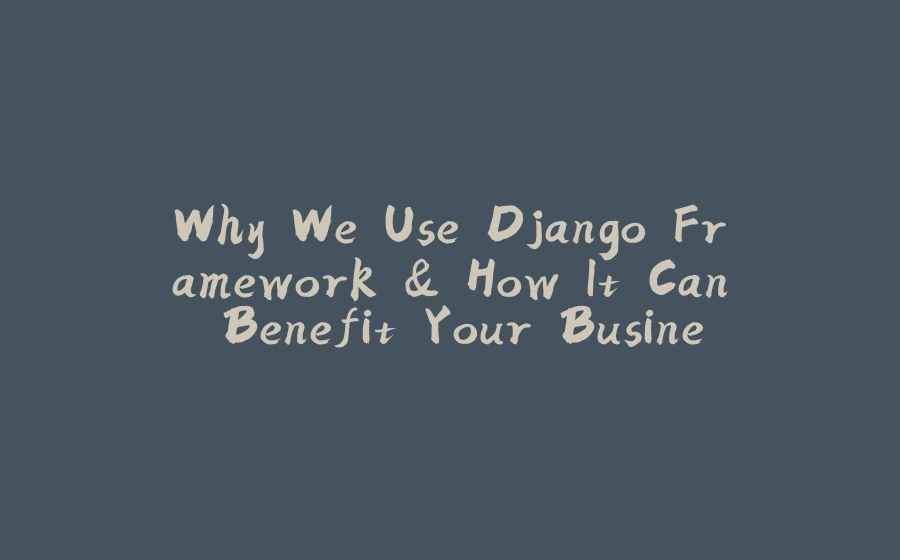



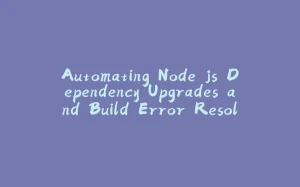





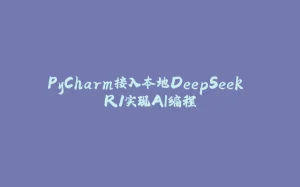
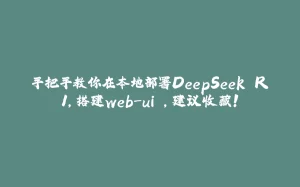




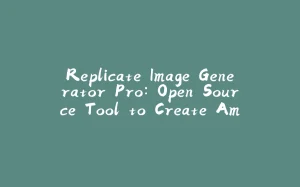
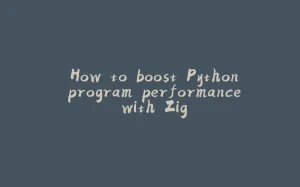
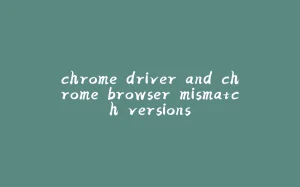
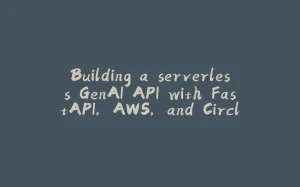






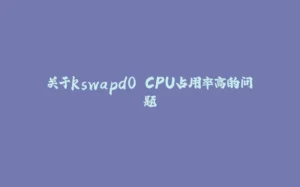






暂无评论内容